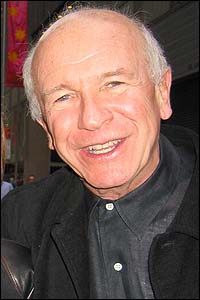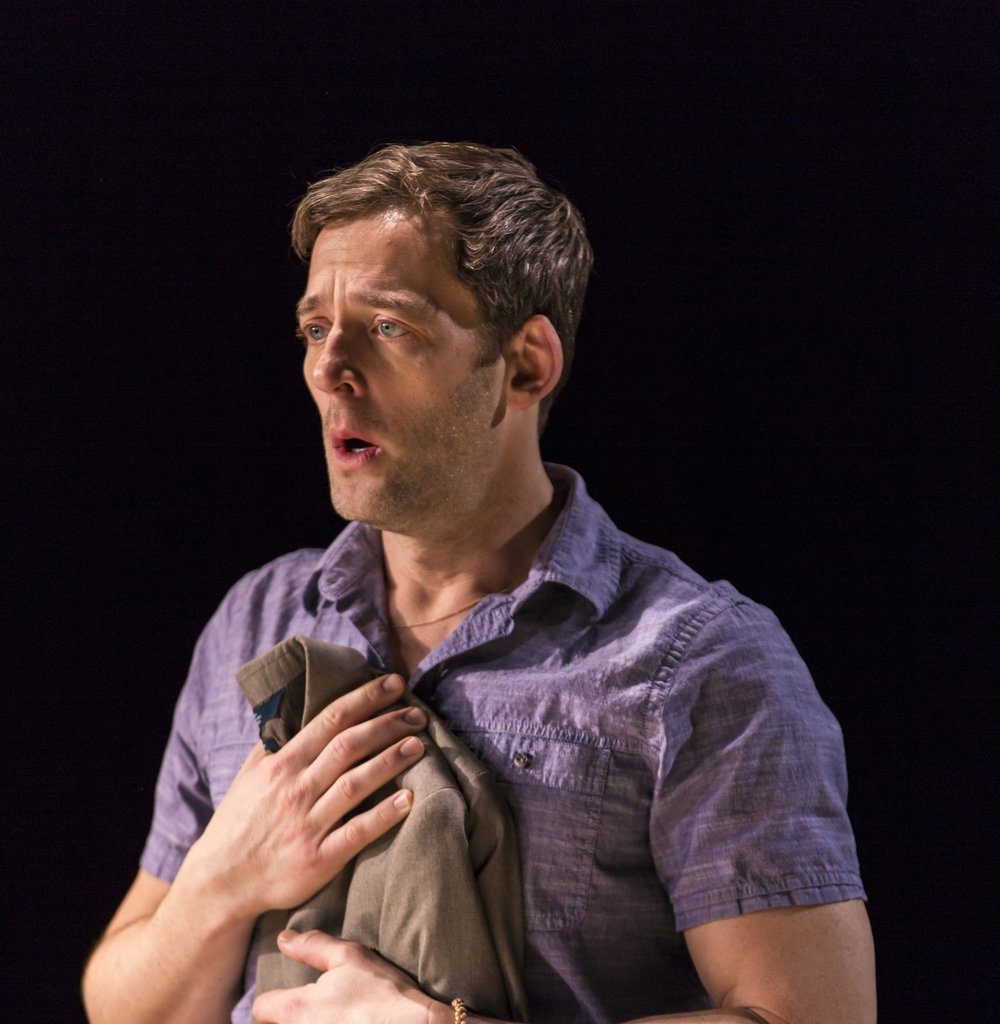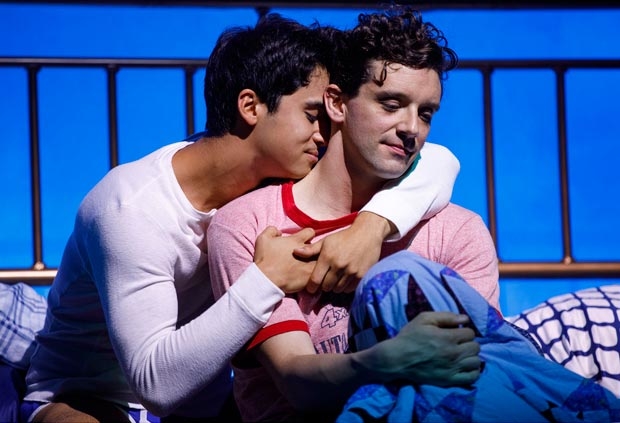 The Other Day
The Other Day
A play by Mark Jason Williams
Loretta Michael Productions
Theater at the 14th Street Y
THE OTHER DAY is a play that grows on you—in a good way. This bare-bones production staged at the Theater at the 14th Street Y begins with two men dawdling after a meeting of their twelve-step program. Mark (played by David Dean Bottrell), the older of the two, a shy, middle-aged, unassuming type with glasses, seems at first intent to avoid the passing inquiries of the thirty-ish Santo (Sandro Isaack), whose long, thick ponytail whips around from shoulder to shoulder as he seeks to goad Mark into revelations. Santo is stocky-sexy, lounging in his chair in the sort of man-spread that annoys people on the subway but here seems a seductive provocation.
Soon enough, Santo makes his sexual interest in Mark quite clear, and the necessary start-and-stop banter ensues, with Santo trying to break down Mark’s obvious barriers. They spend the night together. Neither ever suggests that it is probably off-limits to be “fraternizing” with another member of the twelve-step program. No matter: Santo is hardly one to adhere to the rules, a trait that eventually becomes the heart of a developing relationship that allows Mark to open up, experience real delight, and bring Santo into his home in an unlikely union of opposites. Together, they clean up their addictions, and for a while seem to be in couple heaven.

Egging on their picture-perfect but still odd-couple romance is Mark’s sister Dina (Elizabeth Inghram), a high-octane urban sophisticate in a marriage to a never-seen high-power architect. We are made to understand that Dina’s life consists of presenting herself as a capable more-than-trophy wife who attends fundraisers, rushes off to meetings, and is buried in smart- phone texts prompting suddenly urgent phone calls. She is too cool to be anything but delighted by her gay brother’s serious involvement with the warm and affable Santo. That Dina herself is preoccupied by a marriage that is not really fulfilling provides a kind of counterpoint to Mark and Santo. However, playwright Mark Jason Williams, who’s so good at establishing relationship dynamics through dialogue, has chosen to make Dina’s husband a presence marked by absence. The role of Dina is under-written, and what is there can trend into caricature despite Elizabeth Inghram’s best efforts to present a conflicted character in three dimensions. Dina’s compulsive energy, her obvious drive forward to who-knows-where, is never tested in a way that would add depth to her character.
Instead, the play tracks Santo’s unwinding as addiction re-emerges and sexual wanderlust returns. To what extent Mark’s more cautious and domestic temper has encouraged Santo’s swing remains a question explored in the play’s second half, which shifts the scene to Amsterdam—a place key in Santo’s imagination, where Anne Frank in hiding has been a symbol of the many subterfuges of a life of gay addiction. Mark and his sister Dina travel together to the charming city—presented on stage as a series of large projected images of classic canals and the Homomonument, the site on the bank of Keizersgracht canal commemorating gays killed by the Nazis and memorializing LGBT oppression generally. Yet these greater-than-life-size backgrounds seem jolting after the intimacy of the first half. A more central element of this relocation is Mark meeting up with an airport customer service agent, Steven, when Mark finds his luggage has not made it to Amsterdam and Steven helps him track it. Suddenly, lessons learned in his relations with Santo re-emerge as guideposts for the possibility of a new romance.
David Dean Bottrell as Mark and Sandro Isaack as Santo play well separately and together. Viewing the way they navigate their relationship, both through addiction, post-addiction, and in relapse, is the core of the play’s drama; the part set in Amsterdam is certainly haunted by the first act—rather literally, if I may chance a spoiler-alert—but ultimately the scenes in Amsterdam don’t cohere to what has preceded them. Williams has set himself a structural problem; the second section has its pleasurable moments, abetted by John Gazzale as the genial agent Steven, who nurses Mark through his luggage withdrawal. But the feeling that the play’s second section has not grown organically from the first takes us away from themes of domesticity and spontaneity, possessiveness and freedom that had previously begun to emerge.
Allen Ellenzweig, a frequent contributor to these pages, is a writer based in New York City.






